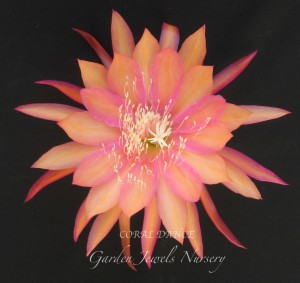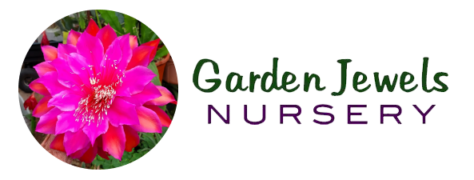|
Epi Care by Month June |
|
BUY
 After your plants have finished blooming you should begin to trim them. You can also buy cuttings and after they have dried for a couple weeks you can root them before the cold winter months. If you have questions please do not hesitate to call our Nursery at 619.987-6251 or ask about availability or email us. After your plants have finished blooming you should begin to trim them. You can also buy cuttings and after they have dried for a couple weeks you can root them before the cold winter months. If you have questions please do not hesitate to call our Nursery at 619.987-6251 or ask about availability or email us.
PLANT
Once your Epis have bloomed you may want to re-pot to keep them properly groomed. Every three to four years is recommended. You will want to pot-up (next size larger pot) if your plant is falling over or too large for its container. Good time to root cuttings. If you have questions, please do not hesitate to give our Nursery a call at 619.987.6251 or email us at Katie@garden-jewels.com or email us.
FERTILIZE
After the plant has bloomed is the time to fertilize your epis for growth. Use a balanced fertilizer such as 10-10-10 or 14-14-14. Follow the directions on the container as to how often A fertilizer rated 21-21-21 is simply three times stronger so use two thirds less. If you use Osmocote remember that dissolution only occurs at temperatures above 70F. You need to consider where your plants are growing and what the climate is. You might not want to use this time or slow release fertilizer. Usually two teaspoons per 9 inch pot should be sufficient. It should be scattered upon the surface of the soil and may be worked into the top half inch. Remember to look at your plants before you “just fertilize” If there is a build-up of fertilizer from previous years (maybe old plants that have not been re-potted in several years) the “crust” greatly inhibits water from entering the pot and reaching the roots below the top inch of the soil … thus you are not improving your plant. Bottom line – don’t just blindly throw a scoop of fertilizer in your plants. Call Garden Jewels Nursery at 619-987-6251 if you have any questions. You can email us.
WATER
Epis use little water. Place a small flat rock on your mix and check it weekly. Turn it over and see if it is moist or not. If it is wet do not water. If it is not wet continue to test for watering by sticking a finger an inch or two into the mix. If it feels damp don't water. If it feels dry water until you see it drain out the bottom of the container. Mist between waterings when the weather is hot and dry. Call Garden Jewels Nursery at 619-987-6251 if you have any questions or you can email us.
PRUNE
Continue to prune your plants. Your plants will let you know which branches to remove and which to leave. Remove all dead and withering plant material by breaking off branches or by using sterilized shears. The blooming season has just and the growing season is upon you . Be alert to weed seeds, which have been waiting for warm weather to germinate. Diligent removal of weeds will eliminate more drastic measures after they take over your pots. Oxalis, one of the most common and tenacious weeds has a long tap root that must be removed. Call Garden Jewels Nursery at 619-987-6251 if you have any questions or you can email us.
PROTECT
You need to continue to keep your plants in the shade to avoid sunburn and dehydration. Check the moisture of your soil at least weekly. Stick a finger a few inches into the potting soil to judge dampness. It your plant dries out it could be because of the potting mix you are using. It is also possible that your plant’s root system is too big for the pot, thus there is no room for the potting soil to hold moisture. Misting the growing area will cool your plants and the surrounding area. The best time to mist is in the evening when temperatures are diminishing and the stoma or “breathing pores” of the plant open, thus allowing the plant to absorb moisture from water it contacts. Call Garden Jewels Nursery at 619-987-6251 if you have any questions or You can email us.
INSPECT AND TREAT FOR PEST/DISEASE
Inspect your plants for insects. Scale and mealy bugs are usually the most prevalent pests at this time. Sprayed solutions of Malathion or insecticidal soaps are usually the best for most insects. If you experience an infestation of scale you might have to remove the plant from its pot a give it a complete scrub-down with a toothbrush saturated with one of the insecticides mentioned above. Remember to put out snail and slug bait. Cabbage moth larva (small green to gray “inch worms”) can wreak havoc on tender growth. A valuable home defense for these pests is a 50/50 percent solution of rubbing alcohol and water sprayed from an atomizer. Call Garden Jewels Nursery at 619-987-6251 if you have any questions or you can email us.
TRANSPLANT
We re-pot to encourage growth, which will hopefully then encourage blooms in the Spring. As a general rule you should re-pot your Epi after it stops growing or stops blooming. every two to four years. The tendency is to re-pot too often. Epis like to have crowded roots in order to bloom better. This is an optimal time for rooting cuttings and "potting-up". You should pot “raw” cuttings with the areoles or notches facing upward in a dry to barely moist perlite no deeper than 1 ½ inches to 2 inches. Mist the cuttings for several weeks – do not saturate the perlite. Mist the cuttings twice weekly without getting the perlite wet. As your cuttings take root they will often produce roots from the areoles above the soil level and at the terminal end – this is a sure sign that your cutting is rooting beneath the perlite. Once your cuttings have taken hold (a slight tug that has resistance) they will begin to re-hydrate and are ready to be moved into regular soil-mix. After re-potting do not water for a week then water Lightly till new growth appears. "Potting-Up" an Epi is necessary when the plant has outgrown its pot and you want it to grow larger. This is a good time to "pot-up" your non-blooming Epis. The new pot should be just slightly larger than the old pot. Transplant the Epi into new mix tapping the mix gently to remove the air pockets. After "potting-Up" do not water for one to two weeks depending on the size of the plant. (smaller=shorter…larger=longer). Call Garden Jewels Nursery at 619-987-6251 if you have any questions or you can email us.
SPECIAL REQUIREMENTS
Your epies need light and they need protection from the summer’s burning sun. Summer holds the greatest potential for foliage damage due to too much sun exposure in combination with higher temperatures and low humidity. You might need to add additional shade cloth to protect your plants. Summer is also the traditional season to repot, fertilize and prune your epies. Call Garden Jewels Nursery at 619-987-6251 if you have any questions or you can email us.
|

619-987-6251
Garden Jewels Nursery is San Diego's primary resource for Epiphyllums, or Epi- Hybrids & Species,
Oxypetalum, Orchid Cactus, Jungle Cactus, Hookeri, E. Crenatum and Semi Shade Plants.
Oxypetalum, Orchid Cactus, Jungle Cactus, Hookeri, E. Crenatum and Semi Shade Plants.